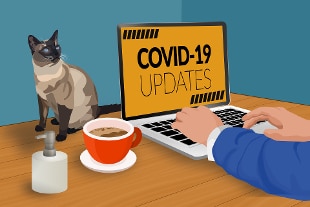Covid-19, Rai journalist serves for the Tg from the hospital bed
Radio journalist kills himself with disabled daughter and leaves message on tape: he feared for the future
Share
November 24, 2020 During the Covid-19 emergency, three quarters of Italian journalists (73%) came across cases of disinformation: 78% of these at least once a week, while 22% even once a day.
Most of the misinformation has traveled to non-traditional online sources (social media, search engines, messaging systems).
This is what emerges from the latest Report of the Observatory on Journalism, "The profession under the test of the Covid-19 emergency", unanimously approved by the Council of the Authority for Communications.
The third edition of the Report of the Authority on Communications highlights in particular the challenges of the pandemic to the journalistic profession.
It does so through a survey conducted last summer among information professionals.
Journalists in lockdown
For their work mainly carried out remotely due to the lockdown, almost 9 out of 10 journalists have resorted to institutional sources rather than direct feedback, but this does not seem to have had a significant impact on readers, at least with regard to the news relating to health aspects: in 7 out of 10 cases citizens said they were satisfied with the information received.
Medical-scientific information
Although with important exceptions, the report underlines, there has been a generalized difficulty of the editorial offices in technically measuring themselves with the languages and specific needs of medical-scientific information, effectively 'delegating' to institutions and experts the the task of informing citizens directly, as well as certifying the authority and quality of information on the subject.
Older, more precarious, less prepared
As regards the state of health of the profession, what has already been highlighted in the two previous editions of the Report is confirmed: progressive aging of journalists;
widespread insecurity;
unsatisfactory specialist preparation in particular on economic, scientific and technological issues;
growing hybridization of the journalistic profession strictly understood, with professional activities related to the field of communication.
All in a continuing crisis of identity and role of the profession, within the broader picture of strong difficulties in publishing.
Public consultation and proposals to the government
The Communications Authority has decided to launch a public consultation to shed light on the real conditions of journalistic work.
The Authority will therefore initiate meetings with the Undersecretary for Information and Publishing and with the stakeholders to collect proposals and undertake a discussion on the main issues in the sector, also in order to develop useful information for the legislator and make proposals to the Government with the 'goal of protecting and renewing journalistic information in Italy.

